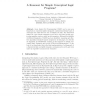393 search results - page 18 / 79 » Logic Programs with Classical Negation |
LPNMR
2009
Springer
14 years 1 months ago
2009
Springer
We consider random logic programs with two-literal rules and study their properties. In particular, we obtain results on the probability that random “sparse” and “dense” pr...
ASP
2005
Springer
14 years 29 days ago
2005
Springer
The extended answer set semantics for simple logic programs, i.e. programs with only classical negation, allows for the defeat of rules to resolve contradictions. In addition, a pa...
ASIAN
1999
Springer
13 years 11 months ago
1999
Springer
Unfold/fold transformation systems for logic programs have been extensively investigated. Existing unfold/fold transformation systems for normal logic programs allow only Tamaki-Sa...
RR
2009
Springer
14 years 1 months ago
2009
Springer
Open Answer Set Programming (OASP) can be seen as a framework to represent tightly integrated combined knowledge bases of ontologies and rules that are not necessarily DL-safe. The...
ECSQARU
2005
Springer
14 years 28 days ago
2005
Springer
Abstract. Both in classical logic and in Answer Set Programming, inconsistency is characterized by non existence of a model. Whereas every formula is a theorem for inconsistent set...

